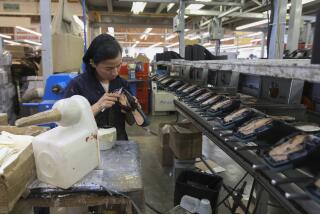Don’t Panic Over the U.S. Trade Deficit
- Share via
As ever in an election season, protecting American jobs becomes a hot campaign issue and a lot of misinformation is fed to voters. We’re told what we lose by buying so many goods from abroad, but we’re seldom reminded how much we gain. The problem is that trade balances are a lot more complex than just the raw numbers of goods bought and sold. Elections are a good time to examine some of these complexities and keep the protectionists in their place.
Japan, of course, is the chief target of much of the attack. Japan currently sells us about $60 billion more each year than we sell to it. But is $60 billion really lost to this country and does it translate directly into disappearing jobs?
The answer is no on both counts.
A couple of factors work to offset that apparent deficit. For one thing, a big share of the dollars that go to pay the Japanese for their goods come right back in the form of investments here. Those investments create jobs and even work to hold down U.S. interest rates. For another, it fails to reflect the real economic influence that American and Japanese companies have on each other’s country. A good analysis of these less publicized relationships comes from Kenichi Ohmae, managing director of the Tokyo office of the American consulting firm McKinsey & Co. According to his article in the Japanese monthly, Bungei Shunju, it’s even possible to make the U.S. and Japanese numbers match.
Using 1984 figures, he calculates that the United States sold $26 billion worth of goods to Japan. But U.S. companies also produced and sold another $44 billion worth of goods from operations in Japan itself. Meantime, Japan sold $57 billion worth of products to the United States while Japanese companies produced only $13 billion from their facilities located in this country. The numbers add up to $70 billion on both sides.
Granted, goods produced by American interests in Japan produce jobs for Japanese, not Americans. But the flow of investment dollars is important to consider as well. Profits from American operations in Japan find their way back to this country, providing capital for growth here.
In addition, many of the dollars that Japanese companies collect by exporting to the United States flow back here as well. They come in the form of purchases of U.S. government bonds, in investments made on the American stock markets and in funds needed by the Japanese to build plants on American soil.
Looked at in this manner, trade balances get to looking less important. And it leads some Japanese, weary of U.S. complaints about the trade problem, to suggest that if this country really is so worried about the numbers, why doesn’t it encourage all those American companies producing goods in Japan to bring those operations home and then export the goods.
It is not a serious suggestion. Obviously, American companies invested in Japan for good reasons. One is that at the time it probably was cheaper to produce the goods there than it was to make them here and then ship them. Another is that it’s often easier to crack a foreign market with an operation familiar with the customers and their culture. The Japanese are discovering this about America.
Meantime, amid all the squabbling over free trade and Japan’s alleged propensity for protecting its own markets, a major change has taken place that will bring about a good many of the changes that protectionists claim to want. The dollar, worth more than 230 yen as recently as three years ago, now has dropped to about 155 yen. What that means is that U.S. goods made here and sold in Japan can cost the Japanese 30% less than they did. Japanese goods sold here, if ultimately raised in price to match the currency change, will cost Americans more than 30% extra.
That means it’s probably no longer cheaper for some American firms to make goods in Japan rather than export them to that country. It means companies such as Sony now have lower labor costs in the United States than they do at home. So, over time, expect to see more Japanese markets opening to U.S. goods and more Japanese companies opening up shop here and hiring U.S. workers.
Trade balances don’t shift overnight and, in the modern world, may not matter that much anyway. They shift in response to basic economics and it’s best if the politicians don’t interfere.
More to Read
Inside the business of entertainment
The Wide Shot brings you news, analysis and insights on everything from streaming wars to production — and what it all means for the future.
You may occasionally receive promotional content from the Los Angeles Times.










